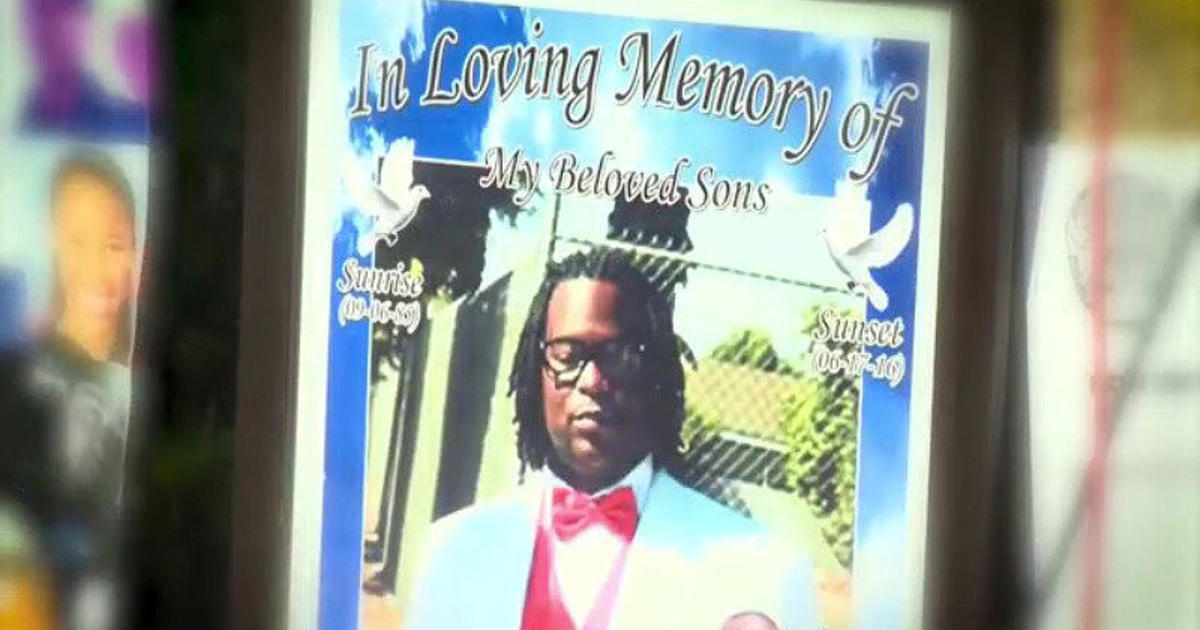The loss of two sons is almost too much to bear for Barbara Pritchett-Hughes, but that one of their murders remains unsolved makes life even more agonizing.
“Never in a million years would I ever think that I would be in the position I’m in today,” she said over her son’s gravestone at Inglewood Cemetery. “It’s the last thing you would imagine for your children.”
Tragedy first visited Pritchett-Hughes when her 15-year-old son Devon Hughes was caught in the crossfire outside of a church in 2007. He died from a gunshot to the head, and his killer was captured within four days.
“That person went to jail and is in jail until this day,” she said.
Nine years later, tragedy struck again.
“Not again. Not again. and I prayed and I asked God to don’t allow this to happen again,” she said tearfully.
Pritchett-Hughes said people came from the front shooting, and left gunshot holes in the concrete block walls. Her second son, DeAndre Hughes, was found dead just steps away from her front door.
(credit: CBS)
She hoped for swift justice again, as had happened with Devon. But since the July 2016 shooting that took DeAndre, his murder remains unsolved. Pritchett-Hughes says she called the detective in her son’s case constantly, but there’s been no developments.
“Nothing. To this day, I still don’t know who’s the person responsible for killing my son 100% for sure,” she said.
LAPD detectives working the case have tried to drum up publicity, asking Pritchett-Hughes to seek public help in the case as authorities offered a $50,000 reward for information earlier this year. And the LAPD prides itself on solving, or as they say, “clearing” homicides and being one of the first police departments in the country to establish a cold-case homicide unit.
But an analysis of FBI crime data by CBS 2 has found that LAPD’s homicide clearance rate has ebbed over the years in a way that is concerning. When Devon Hughes was murdered in 2007, the LAPD’s rate was, on average, on a 7-year climb, and his case was quickly solved.
But starting in 2013, there was a dramatic decline in Los Angeles. By the time DeAndre Hughes was murdered in 2016, the overall trend was already going down and his case remains unsolved. By 2020, the last year of available data, the clearance rate dropped in LA from a 5-year average of around 74% to 55%, representing a 25% drop.
LAPD Chief Michel Moore agrees that the drop was “absolutely” concerning.
“Our thought was we need more resources and what are the underlying influence,” he said.
Further out, an examination of Los Angeles County data found its murder clearance rate fell more than 28%. California as a whole fared better, but still saw a drop of about 14%. Nationally, the drop in solved murder cases was less severe, but was still down 11% compared to the previous 5-year average.
The most dramatic fall happened in the first month after the May 2020 police murder of George Floyd. For the first time in history, that murder clearance rate dropped below 50%. Moore says he believes a rise in homicides, a decline in resources, the pandemic, and civil unrest are all factors — and a drop in community trust has also been key.
“The solving of a crime, a homicide particularly, is dependent on community trusting police,” Moore said.
But community trust has been hard to come by when that same community sees inequity in how its murders are solved. Another look at the data shows it has been racially and ethnically unequal almost across the board.
In 2020, the national homicide clearance rate for white victims was 87%, but for Black victims it was only 59% and 67% for Hispanic victims. In California, homicide clearance rates for those groups, respectively, are 75%, 44%, and 51%.
Closer to home in Los Angeles County, 75% of murder cases involving white victims were solved, but when it came to Black and Hispanic victims, those numbers were 23% and 36%, respectively. LAPD solved 67% of murders involving white victims, and 43% for both Black and Hispanic victims.
That all boils down to a 24-point difference for mourning loved ones like Barbara Pritchett-Hughes, who says she is not surprised by the discrepancy.
“It’s not fair. Homicide is homicide, and we all deserve to have justice for our children,” she said.
For the LAPD, Moore says his detectives treat all cases the same, and they never give up.
“Those individuals all represent lost lives and they leave behind families and friends, and what we hope to do is solve the at some point,” he said.
For now, Pritchett-Hughes is hoping the $50,000 reward will entice someone to come forward with information about the murder of her son.
“I have faith…I don’t know,” she said. “I wouldn’t wish this pain on nobody.”
Complete coverage of “Crime Without Punishment from our CBS stations across the country and CBS News is available here.
